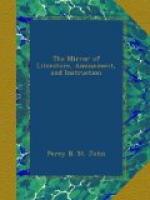May we be allowed to take for granted, that health may be preserved through the same means by which it is recovered? If so, animal food is clearly an impediment to a healthy state of body, for health is restored by a simple and fleshless diet, and therefore may be preserved by the same regimen. That animal food is highly stimulant there can be no doubt; but like all other stimulants, it produces weakness eventually, for when excitement has been brought to its acme, debility must of necessity succeed.
The grand objection to an animal diet, is its detrimental effect upon the mind: it is well known that flesh-eating makes the body strong and lusty, (and it is for that reason recommended to pugilists who are in a course of training,) but the mind becomes weak and inactive; for it must needs happen, where a muddy and clogged body is shackled down by heavy and unnatural nourishment, that all the vigour and brilliancy of the understanding must be confused and made dull, and that, wanting clearness for nobler things, it must ramble after little and unworthy objects. The passions cannot fail to be excited, and thus the whole of the irrational nature becoming fattened as it were, the soul is drawn downward and abandons its proper love of true being. The truth of this we must all more or less have experienced: we are never so lively when we have dined, and the studious man knows well that the morning is the more proper time for his employment.
Why then should we not liberate ourselves from such inconvenience, by abandoning as far as we can a fleshy diet? and let us remember, that even on the score of comfort, the pain of indigence is much milder than that which is produced by repletion. We should thus free ourselves at once from a heavy and somnolent condition of body, from many and vehement diseases, from the want of medical assistance, from “the crassitude of the corporeal bond,” and above all, from that savage and unnatural strength which incites to base actions, so as to escape an Iliad of evils!
F.
* * * * *
MY FATHERLAND.
From the German of Korner.
Where is the minstrel’s Fatherland?
’Tis where the spirit
warmest glows,
Where laurels bloom for noblest
brows,
Where warlike hearts the truest
vows
Swear, lit by
friendship’s holy brand;
There was once
my Fatherland.
What calls the minstrel, Fatherland?
That land, which weeps beneath
the yoke
Its slaughter’d sons,
and foeman’s stroke:
Land of the stern, unbending
oak.
Land of the free,
the German land,
That once I call’d
my Fatherland.
Why weeps the minstrel’s Fatherland?
It weeps before a tyrant’s
dread,
The valour of its monarch’s
fled;
At Deutchland’s voice
a people dead,
Despised, unheeded
its command.
This, this weeps,
my Fatherland.




